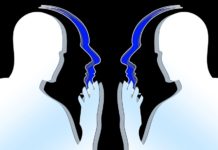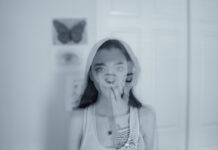Childhood Adversity Influences Levels of Distress in Voice Hearers
Research finds that hearing negative voices explains how childhood adversity is related to distress.
Association Between ADHD and Bipolar Disorder
Researchers in London review the literature on attention deficit hyperactivity disorder (ADHD) and bipolar disorder (BD), finding that "comorbidity and family studies appear to...
$1 Billion J&J Settlement Rejected as Insufficient
Federal prosecutors have rejected as insufficient the $1 billion settlement reached two months ago between Johnson & Johnson and prosecutors in Philadelphia to resolve...
Teen Brain Develops Differently in Bipolar Disorder, When Medicated
The brains of adolescents diagnosed with bipolar disorder develop differently than the brains of teens without the disorder, according to a study in Biological...
Antidepressants Associated with Increased Risk for Manic Symptoms
An analysis of medical records in the UK reveals that the use of certain antidepressants for depression is linked to a heightened risk for mania and bipolar disorder. The research, published this week in BMJ Open, found the strongest effect for serotonin reuptake inhibitors (SSRIs) and the antidepressant venlafaxine.
Bipolar? When Quitting is the Answer
Whether it’s the Nurtured Heart Approach, or any other method that’s truly up to the task, we need these effective strategies and ways of thinking to be more widespread so we can lessen the pitfalls of the medical model’s limited prospective which has no idea of how to turn intense into immensely great.
Hypotheses, Scientific Evidence, and On Being Compared to an AIDS Denier
In today’s Boston Globe (April 14), Dr. Dennis Rosen, a pediatric lung and sleep specialist at Children’s Hospital in Boston, reviews my new book,...
Experts Decry Dangerous Use of Antipsychotics in Children
In a featured article for Psychiatric Services, psychiatrists from Dartmouth raise the alarm on the increasing numbers of children prescribed dangerous antipsychotic drugs. Despite the fact that data on the safety of long-term use of these drugs in this vulnerable population “do not exist,” the rate of children and adolescents being prescribed antipsychotic drugs have continued to increase over the past fifteen years.
Making the Case Against Antidepressants in Parliament
On Wednesday, May 11, there will be an inquiry by a work group in the U.K.’s Parliament into whether increases in the prescribing of antidepressants are fueling a marked increase in disability due to anxiety and depression in the U.K. I wrote about a similar rise in disability in the United States in Anatomy of an Epidemic, and the All Party Group for Prescribed Drug Dependence, which is the Parliamentary group that organized the debate, asked me to present the case against antidepressants.
Different Forms of Childhood Adversity Related to Specific Psychosis Symptoms
In this month’s issue of Psychological Medicine, researchers from King’s College London found evidence for associations between different types of childhood adversity and specific symptoms associated with psychosis. As current categorical approaches to psychosis and schizophrenia diagnoses come under increasing scrutiny, this study adds support to sociological and psychological theories and treatments.
Disease Theory of ‘Mental Illness’ Tied To Pessimism About Recovery
Researchers recently completed a first of its kind, large-scale international survey of attitudes about mental health and they were surprised by the results. According to their analysis published in this month’s issue of the Journal of Affective Disorders, people in developed countries, like the United States, are more likely to assume that ‘mental illnesses’ are similar to physical illnesses and biological or genetic in origin, but they are also much less likely to think that individuals can overcome these challenges and recover
Emotional Child Abuse Just as Harmful as Physical Abuse
Different types of child abuse have equivalent psychological effects, according to a study in JAMA Psychiatry. It has previously been assumed that emotional and verbal abuse could have different or less harmful impact on a child’s psychology than physical or sexual abuse, but research now suggests that these forms of abuse can be just as damaging.
Searching for Zen and Finding a Cow
If I had a clinical problem, why was something as ancient and simple as meditation helping me? And if normal positive human habits could be so profoundly useful, why the heck was the field marketing pills and “clinical” coping mechanisms to me instead? This frustration helped me jump ship from the medical mindset and hop into the world of humanity.
Many Foster Kids Are Still Being Prescribed Antipsychotic Drugs
Many experts expressed concern when the rate of antipsychotic prescriptions to children in foster care showed a rapid increase, peaking in 2008, and new recommendations and policies have tried to curb the use of these drugs. While the rate has plateaued, a new study points out that the “new normal” prescription levels are still dangerously high. The data reveals that almost one in ten children in foster care are currently being prescribed antipsychotic drugs with dangerous side-effects, many for diagnoses like ‘ADHD’ and disruptive behavior.
Experts Stress Importance of Social Networks for Psychosis and Bipolar Interventions
Researchers develop a novel approach to mapping personal well-being networks for those diagnosed with severe mental illness (SMI) that incorporates social ties, connections to place, and meaningful activities.
Out-of-home Placements for Children Increase Odds of Psychiatric Issues
When controlling for social and family characteristics, separating children from parents into out-of-home care increases psychiatric issues, prescriptions, and criminal activity.
Could ‘Treatment Resistance’ be an Effect of Antidepressants?
Previously taking antidepressants could make individuals less likely to respond to treatment for bipolar II depression.
What Caused the American Child Bipolar Epidemic?
-Psychiatrists analyze why US bipolar diagnoses in children and adolescents increased 40 times over in less than 10 years.
Study Explores Sexual and Intimate Partner Violence in College Women with Disabilities
A new study explores sexual violence and intimate partner violence in college women with mental health related disabilities.
Madness Radio: Sharna Olfman on Medicating Children Diagnosed Bipolar
Professor Sharna Olfman has researched and written extensively about children in society, including education and sexuality, and her perspective on so-called bipolar disorder is...
Labels Initiates Core Social Support, Lose Peripheral Ties
Article Abstract:
Although research supports the stigma and labeling perspective, empirical evidence also indicates that a social safety net remains intact for those with mental...
“Why Are So Many Children on Antipsychotic Drugs?”
“Do they make people less aggressive? Yes, sometimes they do. Will they sedate people? Absolutely. Will they make kids easier to manage? They will,” Robert Whitaker tells Liz Spikol for Philadelphia Magazine. “But I know of no study that shows that medicating these kids long-term will help them grow up and thrive. The developing brain is a very delicate thing. The narrative is that these side effects are mild, and that’s just not true, and that the benefits are well-established, and so often they’re not.”
Reflections on a Pathologized Adolescence and a Vision for the Future
My heart envisions a future of grassroots community-based, free, accessible, welcoming, non-judgmental and safe spaces for young people in the middle of the hurricane of adolescence....They will be spaces facilitated by those of us who’ve reclaimed what it means to be human.
Researchers Faked Data on Epigenetics of Bipolar Disorder
The British Journal of Psychiatry has issued a retraction of an article purporting to have identified evidence of the epigenetic aspects of bipolar disorder,...
FDA Approves Another Antipsychotic for Children
The FDA has approved the atypical antipsychotic Saphris (asenapine) for use in children on the basis of one trial.
















